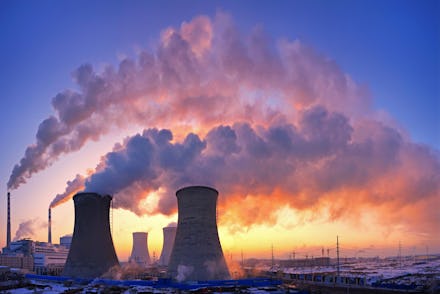Obama Just Dealt Another Blow to the Fossil Fuel Industry

With his eye on the long view, President Barack Obama promised to take measures to rehaul the role of the fossil fuel industry in the nation's energy production during his final State of the Union address on Tuesday night. Just three days later, his administration is beginning to make good on that promise.
On Friday, the Interior Department announced a moratorium on new leases for coal mining on federal lands. The pause comes in tandem with a major review of the federal coal program by the department, aimed at calculating the environmental costs of the coal industry's activities and the financial return taxpayers should be receiving from the industry's often very cushy lease terms.
"Given serious concerns raised about the federal coal program, we're taking the prudent step to hit pause on approving significant new leases so that decisions about those leases can benefit from the recommendations that come out of the review," Interior Secretary Sally Jewell said in a statement. "During this time, companies can continue production activities on the large reserves of recoverable coal they have under lease, and we'll make accommodations in the event of emergency circumstances to ensure this pause will have no material impact on the nation's ability to meet its power generation needs."
What it means: The length of the pause on new coal-mining leases has not yet been determined, and coal companies can continue mining the coal reserves already under lease. The administration estimates that these existing leases are sufficient to maintain levels of coal production for the next two decades.
The pause in new leases won't affect energy production needs, and the directive includes a number of exceptions and emergency provisions to ensure production doesn't drop. But the moratorium and review does portend to some serious changes for the future of the coal industry and the fossil fuel industry more generally.
Roughly 40% of coal mining in the United States takes place on public land, and coal companies benefit from lease payments from the federal government that often lie below market value.
While there is not yet an official evaluation of the sum effect of greenhouse gas emissions from fossil-fuel production on public land, the Interior Department cited an independent analysis estimating that nearly 30% of the nation's annual total energy-related emissions comes production on lands leased from the government.
In other words, any action to re-assess how exactly fossil fuel extractors can use federal lands is hugely consequential. Just as important, it's another loud and clear signal to investors from the White House that fossil fuels are, in the long run, on the wane.
Progressive climate change policy groups lauded the new announcement with enthusiasm.
"This moratorium will send coal to the mortuary," said Jason Kowalski, policy director at 350.org, in a statement. "Any proper accounting of coal's impact on the climate will conclude that this fossil fuel needs to be kept deep underground. Taxpayers will save a lot more money by avoiding the disastrous climate and health impacts of burning coal than we'll get from a few extra dollars tacked onto new coal lease sales."
The context: The review and pause on the new lease process isn't unprecedented — it's happened twice before during the 1970s and 80s. But given some of the administration's recent ramp-up of measures against the fossil fuel industry, this review process could have some enormous implications for its economic prospects in the near future.
In August, the Obama administration announced a new set of regulations that imposed the first-ever restrictions on carbon emissions by power plants. The Clean Power Plan called for a 32% reduction in power plant carbon dioxide emissions from 2005 levels by 2030, a plan that if fulfilled could rapidly curb the construction of coal-fired power plants — and shut many that exist. And in November, Obama rejected construction plans for the Keystone XL pipeline, a project that was opposed by environmentalists for years.
These actions, along with the Obama administration's fruitful participation in the Paris climate talks in December, are creating some long-overdue momentum for the climate change movement. But all of these policies, which have been handled without congressional involvement, could be reversed by the next administration. While the Democratic presidential candidates have chosen to not make climate change a major focal point of the race, their election would likely protect and strengthen these kinds of policies. But a Republican in the White House would very likely push back these actions.